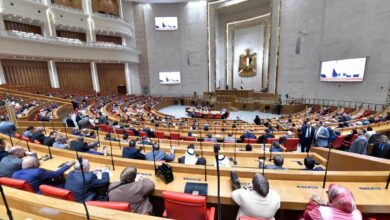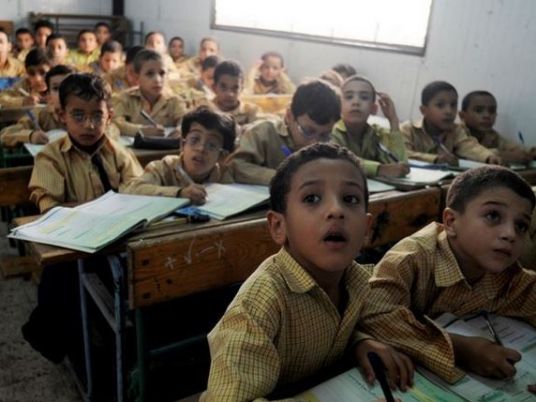In the video, terrified schoolchildren line up at their teacher’s desk in a Delta kindergarten to have their homework corrected. What comes next was a rude awakening for Egyptian society. The teacher strikes each sobbing student with a stick, dragging them by their hair.
“Will you do better next time?” he asks. The person behind the camera laughs.
Despite the outrage the video stirred, the teacher was released and punished with a fine. Parents of the victims protested his incarceration, saying they had asked him to beat their children.
This particular video was circulated last year, but incidents of teacher-on-student violence in Egypt’s schools have escalated since the revolution, as shown in periodic reports by human rights’ watchdogs. The problem, educators say, is embedded in the educational system and its incumbent deficiencies. However, it is further exacerbated by a society that largely condones corporal punishment.
According to the Egyptian Center for Human Rights, the past two months have seen 18 incidents of violence against students. One victim was whipped, while another was locked in a bathroom. Students also sustained broken legs, fingers, a broken pelvis, concussion and an eye injury.
Only one incident, when a teacher in Luxor forcibly cut a student’s hair for not wearing a headscarf, caused widespread alarm. The case came amid widespread concern that the political rise of Islamists was encouraging vigilantes to take the implementation of Islamic law into their own hands.
An enabling system
Classes in public schools across the nation are overcrowded and understaffed, and teachers, for the most part, are underpaid and unsupervised, observers note. This, they say, is an important factor in the general culture of violence.
Abdel Hafeez Tayel, the head of the Egyptian Center for the Right to Education, says that poor infrastructure promotes violence. Amid dire conditions and with little accountability, teachers often resort to violence.
With 90 students per teacher, more than double the international standard, effective instruction becomes impossible, and the teacher is left struggling to maintain order, Tayel said.
Earlier this year, teachers demanding better wages and permanent contracts went on strike and threatened to halt the start of classes.
Watchdogs such as Tayel’s say raising teachers’ wages, decreasing class density, and fixing curricula to promote an education based on independent thinking are crucial to improving the situation.
Meanwhile, neither the 1971 Constitution, nor the new draft address the quality of education in the country.
With the existing cracks in the system, the issue of impunity further exacerbates the problem. According to law, physical violence is only punishable by administrative penalties decided on a case-by-case basis.
In cases where parents press criminal charges, the teachers usually get off lightly. After beating an 11-year-old to death in 2008, a teacher in Alexandria received a six-year sentence for manslaughter.
Throughout the increasing incidents of corporal punishment by teachers recently, no teacher received any punishment that amounted to more than a slap on the wrist, says Tayel.
Meanwhile, Mohamed al-Sorougy, a spokesperson for the Education Ministry, said the ministry has launched a campaign to promote a “humane relations pact,” which consists of sessions with parents, teachers and others involved in the educational process to draw new guidelines for the relationships between them.
But Sorougy’s pact did not mask what was, in many instances, state-sanctioned corporal punishment.
In 2010, former Education Minister Ahmed Zaki Badr shocked the public with a statement saying that preventing a teacher from using corporal punishment against the students wasted the teacher’s prestige.
That sentiment did not change with the revolution. In October, the current minister, Ibrahim Ghoneim, said corporal punishment should be allowed as long as it was not severe. Following a wave of criticism, Ghoneim retracted his statement, saying that using a stick in schools is uncivilized.
“Even teachers rejected the minister’s statement allowing corporal punishment and said their prestige would be restored with better wages and not by allowing them to beat children,” said Safwat Gerges, the head of the Egyptian Center for Human Rights.
In November, Dar al-Ifta, a body affiliated with Al Azhar University tasked with issuing religious opinions, condemned only “severe beatings” of students, an implicit approval for other kinds of physical punishments that may not be categorized as severe.
A forgiving society
The issue is exacerbated by parents’ consent.
Mohamed al-Sayed, a doorman in Cairo whose two children go to public school in Sharqiya finds that using corporal punishment is essential for the teacher to keep his “prestige” among students and to get them to learn.
“Those students have to be beaten up in order to understand and benefit from school and respect the teacher,” he said. “Not constant beating, and not to the point of injury, but just once or twice, a pinch maybe.”
For Sayed, the teacher is a father figure and has to scare the children to earn their respect and obedience.
“When I was in primary school I used to hide from the teacher when I saw him in the street. He had prestige, we feared him more than we feared our parents,” he added.
Many find the use of violence justifiable because of the difficult conditions that prevail in schools.
Hussein Hassan, also a doorman, initially said that all violence should be rejected. However, after listening to a passerby who jumped into the discussion saying that violence against children was wrong and ineffective, he quickly said what he really thought.
“Do you want an honest answer? These kids have to be beaten up. In this generation, nothing will work but beating. Students now go to schools with knives in their pockets,” he said. “The teacher is not responsible for one or two students, he has to control a class of 50. The teacher that beats students has prestige.”
As with the collective beating case in 2011, the parents of the girl whose hair was cut by a teacher in Luxor did not want to press charges, Tayel said. When his fact-finding team arrived in the town, they were attacked by parents who did not want the teacher punished.
Tayel said most parents send their children to public schools for social conditioning and a moral upbringing. They see the teacher as a third parent, and give him the leeway to take disciplinary action, often physical, against their children.
“They know that the educational aspect of the schools won’t benefit them so they seek the disciplinary aspect,” Tayel said.
Additionally, in many cases, the school pressures the parents to drop charges. Parents also fear the school could fail their child if they press charges, and most give in with promises from the administration that the incident won’t be repeated, Tayel said.
“There is a sort of an unwritten social contract that the state will allow the kids to achieve a certificate, and in return the parents will pay bribes to teachers in the form of private lessons and will endure their abuse,” Tayel said.
“Society teaches them that all we care about is that you pass from one grade to the other and get a certificate. The parents want their kids to pass, not to learn,” he added.
Physical violence does not only flow one way. Many teachers also endure physical attacks by students and parents.
This piece was originally published in Egypt Independent's weekly print edition.




